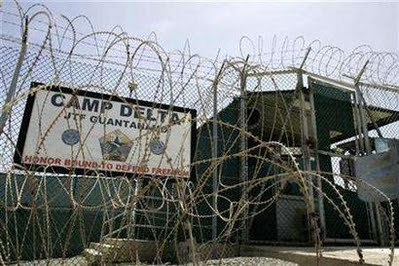President Obama, who made shutting down Gitmo a priority during his campaign and who actually signed the order for closure immediately upon taking office, quickly backed away from the plan. His apologists have blamed Congress for tying the hands of his administration. But guess what? The rest of the world is not enmeshed in American political bickering. The rest of the world watches with dismay as Obama obediently continues the policy of the military-industrial-terror American shadow government. According to Amnesty,
Under international law, domestic law and politics may not be invoked to justify failure to comply with treaty obligations. It is an inadequate response for one branch of government to blame another for a country's human rights failure. International law demands that solutions be found, not excuses. The US administration is currently telling the world, in effect, "we will resolve that Guantanamo detentions when the domestic political climate is right. The USA has not been willing to accept such excuses from other governments seeking to justify their systemic human rights failures, and it should not be accepted when it is put forward by the USA..
AI's "Decade of Damage to Human Rights" report, published just last month, continues:The roots of the problem lie further back, in the longstanding reluctance of the USA to apply to itself international human rights standards it so often says it expects of others. A pick and choose approach to international law by the USA long preceded the Bush Administration, but was built upon in that administration's policy responses to the attacks of 11 September 2001. This included its decision to concoct a global 'war' framework for its counter-terrorism policies under which the applicability of international human rights law was wholly denied. This global war theory -- under which the Guantanamo detentions were but one outcome, though perhaps its best-known and enduring symbol -- continues to infect the body politic in the USA, to the detriment of respect for both human rights both by the USA and more generally.
Lakhdar Boumediene writes a harrowing account of his own long confinement in Gitmo in today's New York Times. He remained a prisoner, without charge or trial, for more than seven years. Even though the U.S. Supreme Court ruled his confinement unconstitutional in 2008, he still had to wait until the following year to be actually freed. He writes:
About 90 prisoners have been cleared for transfer out of Guantánamo. Some of them are from countries like Syria or China — where they would face torture if sent home — or Yemen, which the United States considers unstable. And so they sit as captives, with no end in sight — not because they are dangerous, not because they attacked America, but because the stigma of Guantánamo means they have no place to go, and America will not give a home to even one of them.You can sign the Amnesty International petition demanding the closure of this illegal prison here.

No comments:
Post a Comment